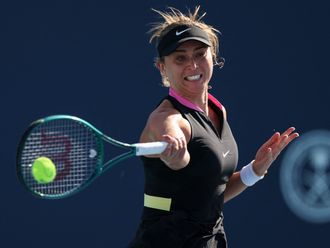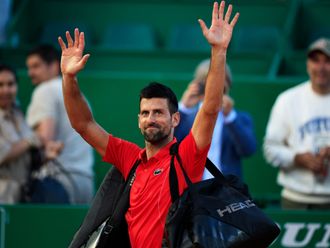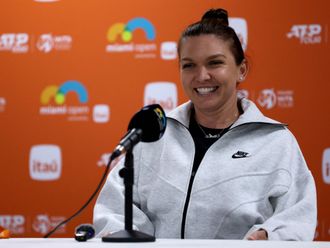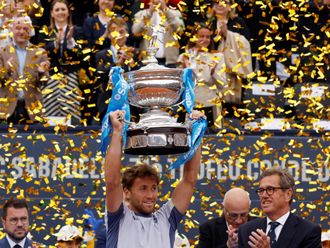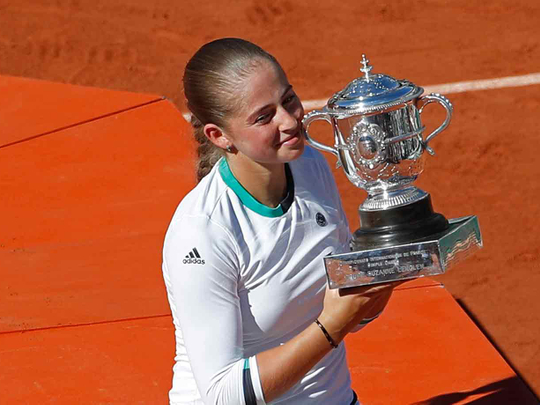
PARIS: Skipping the typical base stations, Jelena Ostapenko powered her way straight to a tennis peak Saturday, winning her first WTA tour title at the French Open.
Her stunning run in Paris - capped by a riveting 4-6, 6-4, 6-3 comeback win over No. 3 seed Simona Halep in the final - made her the first Latvian to win a Grand Slam singles title.
It also made her the first unseeded woman to triumph at Roland Garros since Margaret Scriven of Britain in 1933, when the tournament was known as the French Championships.
Halep, a 25-year-old Romanian, would have secured the No. 1 ranking by winning, but she faltered, just as she did in 2014, when she lost her first French Open final in three sets to Maria Sharapova.
Like Sharapova, Ostapenko is a powerful and fearless hitter from the baseline, addicted to risk and capable of producing winners and unforced errors in flurries.
There were 54 of each against Halep: a less startling statistic for those who had watched Ostapenko pound and shrug her way through the six matches leading to the final.
"At some points I was like a spectator on the court," Halep said.
Ostapenko set the tone from the first rally Saturday, winning it with a big backhand down the line that Halep could not handle. She broke Halep at love in that opening game with a bolt of a backhand winner down the line.
Though Ostapenko would have plenty of wobbles and misfires in the big-hitting games to come, she never once gave the impression that she was out of her element.
After rallying from an 0-3 deficit in the second set and a 1-3 deficit in the third, she finished in style: nervelessly nailing a backhand return winner down the line, to complete one of the most surprising runs in tennis' long history.
"I mean, I think I cannot believe I am Roland Garros champion, and I am only 20 years old," Ostapenko said in an on-court interview after her upset win.
She turned 20 during the tournament and was still a teenager when she lost the first set of her first-round match against Louisa Chirico of the United States. But Ostapenko rallied, as she would against two much more experienced players - 2011 U.S. Open champion Sam Stosur in the fourth round and former world No. 1 Caroline Wozniacki in the quarterfinals.
Add Halep to the list. Despite her early 3-1 lead in the third set Saturday, she could not hold off Ostapenko.
"All the credit for what you have done this tournament," Halep said to her opponent in the post-match ceremony. "It's an amazing thing. Enjoy it. Be happy, and keep it going because you are like a kid."
There have been plenty of even younger prodigies with Grand Slam championships. Tracy Austin, Monica Seles and Martina Hingis were all 16 when they won their first major singles titles. Serena Williams won her first at 17.
But the women's game has been trending older, with Williams' enduring success and with improvements in diet and training methods, which allow players to remain contenders longer.
At 20, Ostapenko is the youngest French Open champion since Iva Majoli won at 19 in 1997 and the youngest at any Grand Slam since Sharapova won the 2006 U.S. Open at 19.
There was a clear opportunity for a breakthrough at this French Open with Williams, now 35, taking a hiatus for the birth of her first child and with No. 1 Angelique Kerber in an extended slump.
But few would have imagined that Ostapenko, who had lost her only French Open match before this run, would be the one to capitalize. Before arriving in Paris, she had prize earnings of $1,288,260 for her whole career. Saturday's victory was worth $2,351,097.
Her relentless, tight-to-the-baseline playing style has elicited some comparisons to a young Seles, but unlike Ostapenko, Seles hit with two hands on both her forehand and her backhand. She also was a much more focused competitor and more consistent ball striker.
Ostapenko has tended to be unpredictable and volatile. Last year, she threw a racket during a tournament in Auckland, New Zealand, that bounced off the court and struck a ball boy. But she held herself in check at Roland Garros.
She will now climb from No. 47 in the world rankings to No. 12.
The last woman to gain her first tour title at a Grand Slam tournament was Barbara Jordan of the United States at the 1979 Australian Open. The last man to manage it was Gustavo Kuerten, who won the 1997 French Open on the day that Ostapenko was born in the Latvian capital of Riga.
"I knew the history," Ostapenko said. "It was my dream. I'm just really, really happy."
Kuerten made an appearance at Roland Garros during its second week and said he had arrived in Paris in 1997 with the goal of winning just one match.
Ostapenko certainly was not planning to go all the way, either.
"Of course," she said, "I didn't expect that when I came here."


